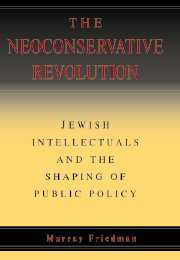Book contents
- Frontmatter
- Contents
- Introduction: American Jews in an Age of Conservatism
- 1 Jews and the Making of the Cosmopolitan Culture
- 2 The Premature Jewish Neoconservatives
- 3 Forgotten Jewish Godfathers
- 4 The Liberal Civil War
- 5 The Modernization of American Conservatism
- 6 The Liberal Meltdown
- 7 The Rise of the Neoconservatives
- 8 Neoconservatives and the Reagan Revolution
- 9 Nicaragua: The Cold War Comes to This Hemisphere
- 10 Irving Kristol and a New Vision of Capitalism
- 11 The Neoconservative Assault on the Counterculture
- 12 Jews and the Christian Right
- 13 Epilogue
- Notes
- Index
7 - The Rise of the Neoconservatives
Published online by Cambridge University Press: 05 June 2012
- Frontmatter
- Contents
- Introduction: American Jews in an Age of Conservatism
- 1 Jews and the Making of the Cosmopolitan Culture
- 2 The Premature Jewish Neoconservatives
- 3 Forgotten Jewish Godfathers
- 4 The Liberal Civil War
- 5 The Modernization of American Conservatism
- 6 The Liberal Meltdown
- 7 The Rise of the Neoconservatives
- 8 Neoconservatives and the Reagan Revolution
- 9 Nicaragua: The Cold War Comes to This Hemisphere
- 10 Irving Kristol and a New Vision of Capitalism
- 11 The Neoconservative Assault on the Counterculture
- 12 Jews and the Christian Right
- 13 Epilogue
- Notes
- Index
Summary
Irving Howe has said that when intellectuals are moved to action, they create a magazine. Irving Kristol is a case in point. He helped to advance the embryonic neoconservative movement in 1965 by founding The Public Interest.
At the time, Kristol's social and political views were undergoing change. Although he had known poverty firsthand and was sympathetic to the goals of Lyndon B. Johnson's Great Society, his skepticism of government planning had led him to believe that poverty could be overcome only by gradual economic growth that brought with it greater economic opportunity for outsiders. A disillusioned liberal, he feared that radical dissent had fallen prey to leftist totalitarianism. He shared with traditional conservatives their distaste for the eruptions of the counterculture. Yet he had no faith in the anti–New Deal, anti–Fair Deal conservatism advanced by Barry Goldwater's 1964 campaign. “We are children of the Depression,” his wife, Gertrude Himmelfarb, told an interviewer, “and are committed to the New Deal kind of welfare state – by present terms, a very minimal welfare state. Social Security is something we regard as a very good thing.”
Kristol considered Bill Buckley's National Review “too strident,” insufficiently “analytical” and “intellectual.” He rejected also National Review's “hostility to the New Deal and its enthusiasm for Jeffersonian individualism.” On the other hand, he distrusted what passed for social scientific thought embodied in the poverty programs, and was troubled by what he perceived as the vague, unfocused idealism of left-wing ideologues.
- Type
- Chapter
- Information
- The Neoconservative RevolutionJewish Intellectuals and the Shaping of Public Policy, pp. 116 - 136Publisher: Cambridge University PressPrint publication year: 2005



